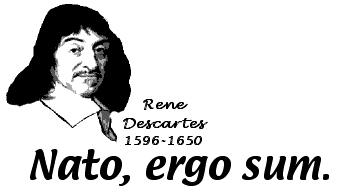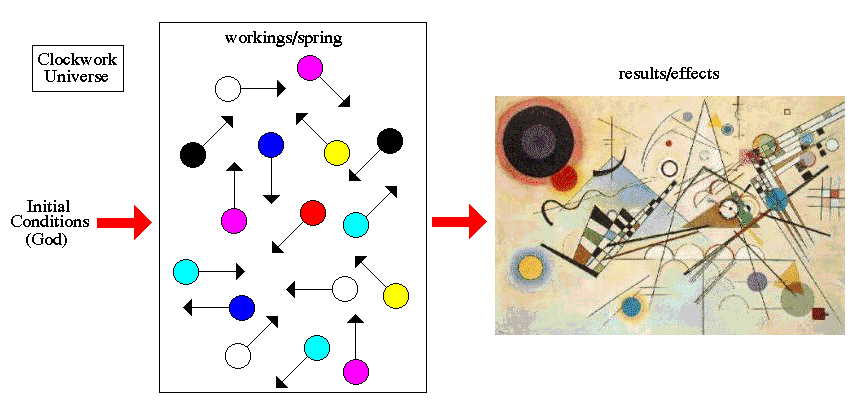 | The French philosopher and mathematician Rene Descartes challenged old ways of thinking about
science. Descartes, for whom the Cartesian system of philosophy is named, argued that doubt and
reason are both necessary for determining truth, and that the world and everything in it operates
according to mechanical principles.
|  |
- If I found any new truths in the sciences, I can say that they follow from, or depend on, five
or six principal problems which I succeeded in solving and which I regard as so many
battles where the fortunes of war were on my side.
- If we possessed a thorough knowledge of all the parts of the seed of any animal (e.g. man),
we could from that alone, by reasons entirely mathematical and certain, deduce the whole
conformation and figure of each of its members, and, conversely if we knew several
peculiarities of this conformation, we would from those deduce the nature of its seed.
What is being expressed here?
And, in the context of this class, this is his most important thought:
By a method I mean certain and simple rules such that, if a man observe them accurately, he shall never assume
what is false is true. |
What is being stated here?
The Doubt Matrix of Descartes
| Skeptical Hypothesis |
What Can Be Doubted |
What Cannot be doubted |
Faculty |
Science |
| The Senses Deceive us at a distance - God the Deceptor - doesn't work - God
is always good - therefore need an Evil Genius to properly deceive |
The size of the sun and stars, the shape of towers and
the color of mountains |
Things observed close at hand, e.g. that I am now seated
in a room etc. |
The senses |
Astronomy |
| The Dream Hypothesis - we have no means of conclusively determining -
at any moment, whether or not we are dreaming - no way to independently separate out
reality from the observer/experiencer |
That I am seated in this room, that I am clothed, that
I have hands, eyes or a body at all |
Truths of mathematics, eg. 2+2 = 4, squares have four
sides etc. |
The imagination |
Physiology, physics, medicine etc. |
| The Evil Genius hypothesis -an arbitrary Evil Genius
exists to screw with us |
2 + 2 = 4, squares have four sides, etc. |
That I exist etc. |
Reason |
Mathematics, i.e. arithemetic , geometry etc. |
Descartes Method of "Reduction":
As a multitude of laws often furnishes excuses for vice, so that a state is much better governed when it has but few, and those few strictly observed, so in place of the great number of precepts of which logic is composed, I believed that I should find the following four sufficient, provided that I made a firm and constant resolve not once to omit to observe them.
-
The first was, never to accept anything as true when I did not recognize it clearly to be so, that is to say, to carefully avoid precipitation and prejudice, and to include in my opinions nothing beyond that which should present itself so clearly and so distinctly to my mind that I might have no occasion to doubt it.
- The second was, to divide each of the difficulties which I should examine into as many parts as were possible, and as should be required for its better solution.
-
The third was, to conduct my thoughts in order, by beginning with the simplest objects, and those most easy to know, so as to mount little by little, as if by steps, to the most complex knowledge, and even assuming an order among those which do not naturally precede one another.
-
And the last was, to make everywhere enumerations so complete, and reviews so wide, that I should be sure of omitting nothing. . . .
The Mechanical/Clockwork Universe of Descartes

Inside the magic box strict rules apply:
matter (is) made up of atoms, colors occur by the reflection of light waves of differing lengths, bodies obey the law of inertia, and the sun is the center of our solar system
If we discover the rules (e.g. Newton), then God has revealed His knowledge to Us. ( Where have we
heard this before? )
In addition, Descartes argued for the conservation of motion. At creation, God had injected a certain amount of motion into the universe and this total quantity of motion had been conserved ever since.
Descartes, like Aristotle, also pronounced that a vacuum was impossible: Motion is transmitted from one object to another by contact , and there are no empty spaces between. What seems to us empty space is merely extremely extended, fine matter.
This, then, is the Mechanical Universe  God winds up the gears and the Universe works like Clockwork To first order, this is confirmed by Kepler's third law.
God winds up the gears and the Universe works like Clockwork To first order, this is confirmed by Kepler's third law.
As this mechanical philosophy gained support in Descartes' native France, so did moves towards a "more efficient" centralised Government control .
Descartes' was quick to draw a parallel between the role of Ruler and Creator,
- God sets up mathematical laws in nature as a king sets up laws
in his kingdom.
Cartesian Dualism
For Descartes the human body and the human mind were discrete entities. The human soul, unlike the mechanical world, was something that could not be broken down
One of the most challenging attacks on this aspect of Descartes' system was that if mind and matter are so radically different, how do they interact? Descartes' reaction to this criticism was that the pineal gland in humans formed a point of interaction between body and soul.
The inadequacy of this explanation was highlighted by the discovery that the pineal gland is also present in dogs, while Descartes had preserved the rational soul for only the human species.
Summary of the Mechanical Philosophy:
1) world is a plenum of matter whirling about in large and small vortices; no void;
2) God originally created the world by putting matter into motion according to certain laws; time took care
of the rest; everything is matter in motion.
3) Only two real or primary substances in the universe
a) matter (res extensa)--defined as extension and is infinitely divisible.
b) mind (res cogitans)-- non-extended and immaterial; endowed in each of us by God, is what
makes us individuals, (much like a rational soul);
4)Nature is only this lifeless matter in motion; What we call "life" is merely an epiphenomenon of this
matter in motion; it is not intrinsic to nature. We can call things "living," but what we really mean is that
their parts are so disposed as to behave automatically in accord to physical laws of necessity;  e.g. The Clockwork Universe
e.g. The Clockwork Universe
Point 4 also means this:
-
Humans distinct from Nature:
- Only man is endowed with mind and therefore can think.
- The non-human animals are automata (mechanical contrivances).
What does this say about the Human relationship with Nature?



 God winds up the gears and the Universe works like Clockwork To first order, this is confirmed by Kepler's third law.
God winds up the gears and the Universe works like Clockwork To first order, this is confirmed by Kepler's third law.